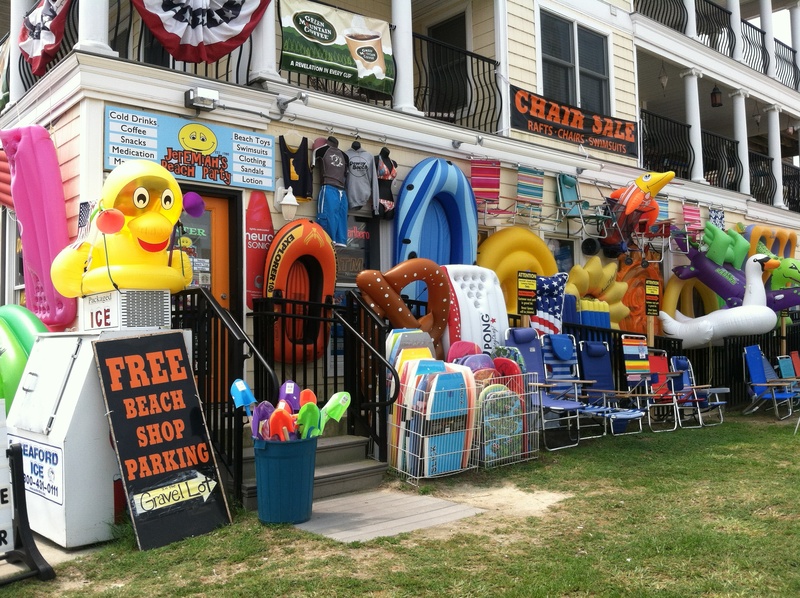A lawsuit over Dewey Beach’s outdoor display ordinance could be on the verge of settlement. The town’s Planning Commission met July 11 to discuss changing the law to help resolve a three-year legal battle between the town and Jeremiah’s Beach Party.
Jason Fruchtman, owner of Jeremiah’s, a beach variety store on the corner of Route 1 and Dagsworthy Avenue, filed a civil lawsuit in Delaware District Court, December 16, 2010, against former Town Manager Diana Smith, Building Inspector Bill Mears and the town of Dewey Beach, seeking damages for violation of his constitutional and commercial free speech rights.
According to Fruchtman’s complaint, town ordinances involving displays are unintelligible and should be void for vagueness. The suit also says Jeremiah’s is protected under the town’s Grandfather Clause because the business existed before the display ordinance was established.
In the town’s response to the complaint, attorney Megan Mantzavinos denies any violation of Fruchtman’s constitutional rights. She asked that all claims against Mears and Smith be dismissed because they are immune from personal prosecution because of their position as town officials.
Mantzavinos also wrote Fruchtman’s claims should be barred by the doctrine of unclean hands, meaning he acted unethically and in bad faith.
The parties attempted to negotiate a settlement, but in an April 20 letter to U.S. District Court of Delaware Judge Leonard Stark, Mantzavinos said the parties were unable to resolve the case and asked Stark to rule on pending cross-motions for summary judgment.
According to Planning Commission Chairman Harry Wilson, a settlement is still in the works, and the commission was asked to approve changes to the outdoor display ordinance to remove ambiguity and make it easier to enforce.
According to the display ordinance, outdoor displays cannot take up more than 30 percent of the area of the building, and the maximum lot area that can be used for displays is 500 square feet. Displays also cannot be higher than 12 feet.
Several members of the commission said the town could remove the 30 percent requirement, and set the maximum useable area for outdoor displays at 500 square feet.
Planning Commissioner Marty Seitz argued that setting a specific square-footage could be considered discriminatory against larger businesses or businesses with corner lots. “If they have a real estate advantage, they cannot take advantage of it under this law,” he said.
Seitz said Fruchtman has about 1200 square feet of space available for outdoor displays.
Planning Commissioner David King said most businesses don’t have more than 100 to 200 square feet of space to use for displays. At 30 percent, Fruchtman is currently restricted to using only 400 square feet of space, King said.
He said if the town sets the maximum at 500 square feet, it would relax the requirements for all the beach variety stores, including Jeremiah’s.
Mayor Diane Hanson, who attended the meeting, said she is worried taking the 30 percent requirement away would exacerbate the problem of excessive outdoor displays. “What I don’t want is what we have right now. It’s just too much,” she said.
Building Official Bill Mears, who also attended the meeting, said other beach variety stores are in compliance with the outdoor display ordinance. “Theother people are trying to abide by what the code says,” Mears said. “Jeremiah’s has so much road frontage that nobody else does.”
Mears said outdoor displays at Jeremiah’s take up more than 500 square feet on only one side of the building. “No he’s not compliant,” Mears said. “He’s never been complaint.”
Mears, Hanson and Town Manager Marc Appelbaum were the only people besides the seven planning commissioners to attend the meeting.
Wilson said business owners told him they were not interested in attending because the settlement between the town and Jeremiah’s was not going to be discussed.
The commission did not approve the proposed changes, and it plans to take up the issue again at its next meeting in August. Town council removed a vote on the proposed ordinance from its agenda July 12.
After the meeting, Appelbaum said the town attorney and Fruchtman had agreed on proposed changes to the ordinance and were prepared to settle the lawsuit if the changes were approved by town council. "He agreed with the draft ordinance," Appelbaum said of Fruchtman.
"I wanted to settle it before summer was over, but we're not going to be able to do that now," Appelbaum said.






















































